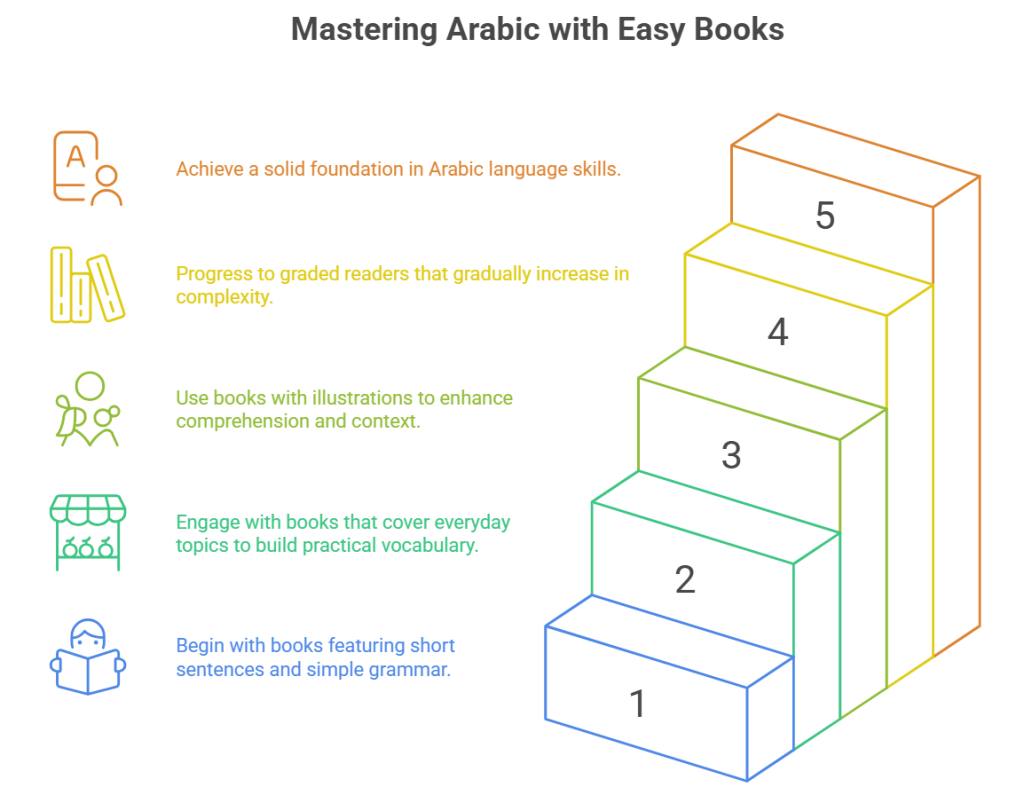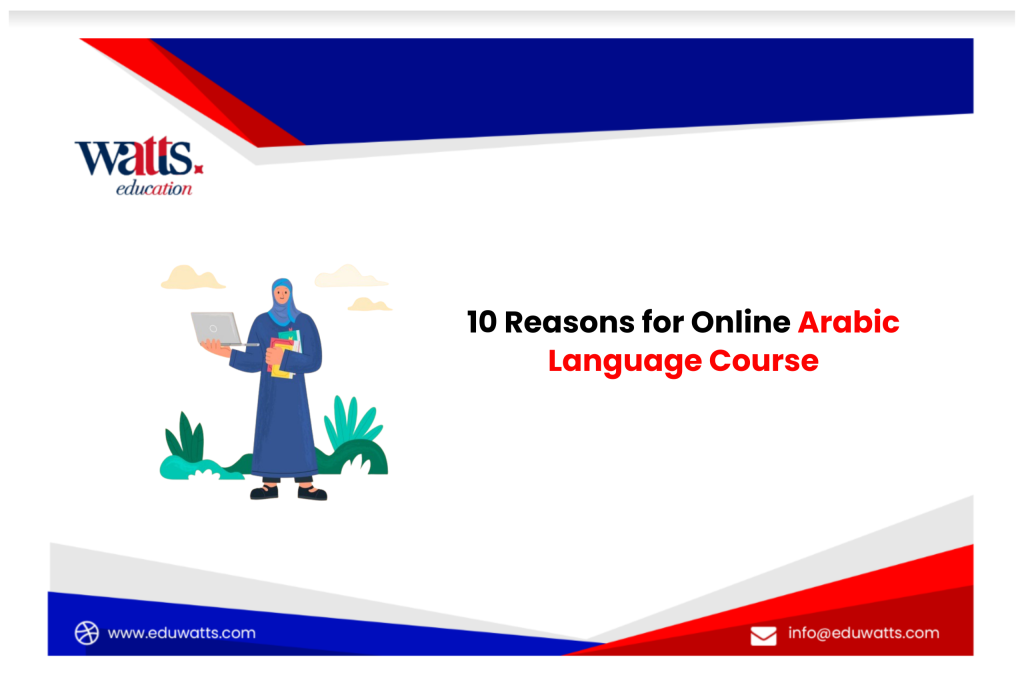The Arabic tongue is one of the most interesting and widespread languages. Arabic, with 400 million speakers in more than 20 countries, is a language of enormous cultural, historical and professional importance. Whether you intend to work in the Middle East, engage with Arabic-speaking communities or study its rich body of literature, learning Arabic could be life-changing.
Yet for beginners, a language like Arabic can be daunting because of its strange alphabet, grammar and spoken pronunciation. The good news is that Arabic books to read for beginners could make this trip a lot easier. These books allow the learners not to make learning difficult as they unite grammar and vocabulary with pronunciation and exercises, all in an entertaining way. So here are some of the best and most effective books to read in Arabic if you’re an absolute beginner and ready to step up on your awe-inspiring journey of language learning.
Why Choose Easy Arabic Books?

Top 10 Arabic Books to Read for Beginners
1. Al-Kitaab fii Ta’lim al-Arabiyya
Al-Kitaab ( Best Book to Learn Arabic ) Al Kitaab is one of the top textbook series for learning MSA. It utilises an interactive method featuring grammar, reading comprehension and cultural interpretation. The real-life situations in the book help to build all four skills – reading, writing, speaking and listening.
Writers: Kristen Brustad, Abbas Al-Tonsi and Mahmoud Al-Batal
Why it’s excellent: Provides an immersive and methodical approach with exercises.
2. Step-By-Step Arabic Language: Beginner and Intermediate Learning
True to its title, this book follows a step-by-step progression from simple to more advanced topics. It teaches students core grammar and vocabulary and how to use these in real-life situations.
Author: Nisreen Neqresh Beshqoy
Why it’s great: This is one of the most systematic Arabic books to read for beginners, perfect for self-learners looking for help with structure.
3. Arabic for Dummies
If you have no prior knowledge of Arabic, then the best resource for self-learning is Arabic For Dummies. The author manages to be informative while maintaining an amusingly light touch. It features full grammar explanations, vocabulary lists and pronunciation advice – there’s even a small dictionary included.
Author: Amine Bouchentouf
Why it’s great: The ideal combination of fun and practicality for the absolute beginner.
4. Complete Arabic
Complete Arabic is another great pick out of Arabic books to read for beginners, targeted at those who desire a comprehensive learning experience. It touches on grammar, vocabulary, listening and speaking in 17 nicely laid out units. Additionally, the book offers access to streamed audio, which assists pronunciation and listening skills.
Writers: Jack Smart and Frances Altorfer
Why it’s good: Language learning intersects with cultural understanding for a fuller experience.
5. Read and Speak Arabic for Beginners
This book also makes learning conversational Arabic fun and Interactive. It features pronunciation exercises, vocabulary exercises, and real-life dialogues that you can use to speak in everyday situations with confidence.
Writers: Mahmoud Gaafar and Jane Wightwick
Why it’s great: A fun way to improve communication and fluency with practice-based learning.
6. Easy Arabic Grammar
Grammar tends to be the most difficult part of learning Arabic. This volume clearly explains more difficult grammar points, illustrated by examples and exercises. It’s ideal for language learners who want to establish a strong grammatical base.
Writers: Jane Wightwick, Mahmoud Gaafar
Why it’s great: A condensed grammar companion for use in conjunction with other Arabic books to read for beginners.
7. Essential Arabic: Speak Arabic with Confidence
This book is concerned with practical speaking skills and accent. Among its handy features are a 2000-word glossary and 1500 examples of real-life sentences that suit those who want to learn spoken Arabic.
Author: Dr Fethi Mansouri
Why it’s good: Strengthens listening and speaking skills while building on vocabulary.
8. Gateway to Arabic
Gateway to Arabic is a well-structured, progressive course designed for those who have no prior knowledge of the language. It begins with letters of the Arabic alphabet, and culminates in reading exercises and lessons to test your comprehension of advanced topics.
Author: Dr Imran H. Alawiye
Why it’s great: One of the most useful Arabic books to read for beginners, with simplified instructions to follow.
9. Easy Arabic Reader
As far as fluency building goes, reading is one of the best, and the Easy Arabic Reader can get you there. The book is designed to improve reading comprehension and vocabulary and it contains graded passages from simple to advanced.
Author: Mahmoud Gaafar, Jane Wightwick
Why it’s great: Helps develop reading skills and cultural awareness with entertaining stories.
10. Learn Arabic in 30 Days
For those who want to learned quickly, Learn Arabic in 30 Days gives a short-term and fast-learning swiftness. It will help you quickly learn to read, write and form sentences making this product ideal for travellers and people who need basic fluency.
Author: N.S.R. Ganathe
Why it’s good: A fast, cheap and effective jumping-off point for beginners.
Why Books Are the Best Starting Point?
When you start off learning a language, especially one like Arabic, self-study with books is the best and only way to learn at your own pace. These Arabic Book to Read for beginners are an introduction to grammar, sentence structure and pronunciation. They also have cultural notes and listening exercises to help learners get a handle on language and context—two key factors in fluency.
But adding book learning to expert-led courses could help make your journey easier and more effective. That’s where Eduwatts steps in.
Learn Arabic with Eduwatts — Your Path to Language Mastery

Eduwatts provides a well-organised course in Arabic for learners of all proficiency levels: from absolute beginners (A1) to upper advanced (C2). The goal is to provide an enjoyable, interactive and rich experience of the language.
Key Takeaways of Eduwatts Arabic Course:
- Includes both Modern Standard Arabic (MSA) and regional dialects
- Interactive instruction in reading, writing, speaking and listening.
- Flashcards of vocabulary and real-life situations to help learn.
- Gain the expert opinion of Arabic teachers with feedback.
- Serve as a preparation in academic writing, translation and presentation.
- Access to digital learning resources and activities.
- Get a certification you can use worldwide.
It is not just about making you more fluent, but also deepening your cultural perspective and developing your professional discourse. Whether it is for career advancement, for academic studies or travelling, we ensure that you can fulfil your requirements.
Well, if all you’ve been using are Arabic book to read for beginners, then it’s time to start supplementing them with a professional learning experience that really moves the needle.
Conclusion
It seems daunting to learn Arabic, but with the right tools, it’s actually very fun and rewarding! The above-listed Arabic books to read for beginners are excellent friends for whoever is beginning his or her journey step-by-step, whether it is what you need, foundational grammar or somewhere in the middle to get conversational fluency.
But to have full mastery of the language, organised instruction is necessary. Eduwatts’ Arabic programme bridges the gap with a balanced dose of academic rigour and practical application. So, choose your favourite book, register for the Eduwatts Arabic course and begin speaking a language that will bring you closer to one of the world’s most fascinating cultures.
FAQs
If you’re at the beginning level, then your best choice is probably Al-Kitaab fii Ta’lim al-Arabiyya, Arabic for Dummies, Easy Arabic Grammar and Gateway to Arabic— these are the books you need to establish foundational skills.
Yes. Countless Arabic books to read for beginners feature exercises, audio supplements and cultural elements that facilitate learning on your own.
With persistent efforts, learners can acquire a basic language ability in 3-6 months and then be able to apply this to reading and speaking Arabic.
Modern Standard Arabic (MSA) is taught in most books, but there are some that teach, e.g. Egyptian or Levantine Arabic well.
Expert-led training, hands-on exercises, and an official certification at the end – This is perfect if you’ve started using Arabic books to read for beginners but are looking for the next level in learning.


